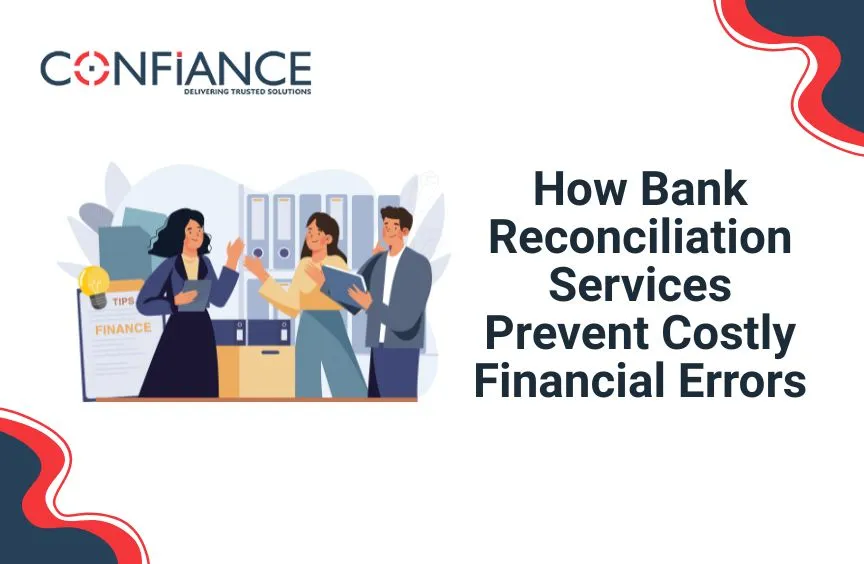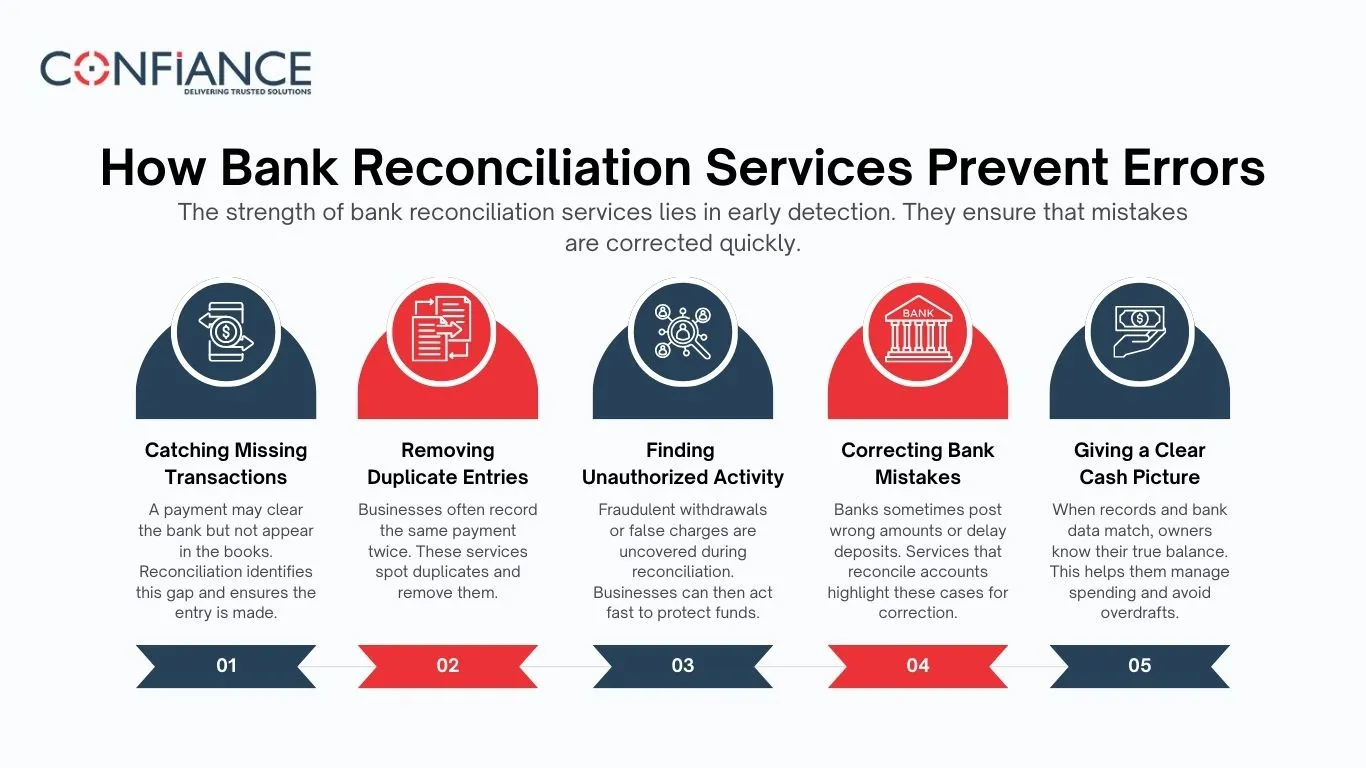
How Bank Reconciliation Services Prevent Costly Financial Errors
Managing money is one of the most important parts of running a business. Records must match the actual cash in your bank account. Even small mismatches can lead to serious mistakes. This is why many companies use bank reconciliation services. These services keep accounts accurate, prevent fraud, and avoid financial errors.
What Are Bank Reconciliation Services
Bank reconciliation means comparing a company’s internal records with its bank statements. The goal is to find differences, fix them, and confirm the balance is right. Bank reconciliation services are professional solutions that handle this process for businesses.
When you use these services, experts review every transaction in your books against your bank account. If they find mismatches, they check the cause and make corrections. This process creates accurate records that reflect real financial activity.
Why Businesses Need Bank Reconciliation Services
Every business deals with payments, receipts, and transfers daily. Small errors can slip into records without notice. Bank reconciliation services help find those errors before they cause bigger problems.
Reasons companies need these services include:
- They catch missed entries.
- They find duplicate records.
- They expose fraudulent charges.
- They confirm tax compliance.
- They give clarity about available cash.
Without reconciliation, financial statements lose accuracy. Decisions based on false numbers often lead to losses.
How Financial Errors Hurt Businesses
Errors in financial data may appear harmless at first. Over time, they build up and create serious risks. Wrong balances confuse owners about how much money they really have. This can result in poor spending decisions.
Effects of errors include:
- Wrong tax reports that cause penalties.
- Overstated income that misguides planning.
- Fraud that goes unnoticed for months.
- Loss of trust with investors and partners.
- Delays in paying suppliers or employees.
Using bank reconciliation services prevents these problems. Businesses that reconcile regularly stay in control of their cash.
How Bank Reconciliation Services Prevent Errors
The strength of bank reconciliation services lies in early detection. They ensure that mistakes are corrected quickly.
1. Catching Missing Transactions
A payment may clear the bank but not appear in the books. Reconciliation identifies this gap and ensures the entry is made.
2. Removing Duplicate Entries
Businesses often record the same payment twice. These services spot duplicates and remove them.

3. Finding Unauthorized Activity
Fraudulent withdrawals or false charges are uncovered during reconciliation. Businesses can then act fast to protect funds.
4. Correcting Bank Mistakes
Banks sometimes post wrong amounts or delay deposits. Services that reconcile accounts highlight these cases for correction.
5. Giving a Clear Cash Picture
When records and bank data match, owners know their true balance. This helps them manage spending and avoid overdrafts.
Process Followed by Bank Reconciliation Services
Professional reconciliation follows a step-by-step process:
- Collecting bank statements and internal records.
- Matching each entry with its pair.
- Flagging differences for review.
- Investigating reasons for mismatches.
- Updating records with correct data.
- Preparing a reconciliation statement.
Bank reconciliation services perform these steps with skill and speed, which reduces the risk of ongoing errors.
Benefits of Bank Reconciliation Services
The value of reconciliation goes beyond fixing mistakes. Businesses enjoy wider benefits.
Accurate Reporting
Reports show real numbers when records match. This builds trust in financial statements.
Strong Fraud Control
Any odd activity shows up during reconciliation. Fraud can be stopped before it grows.
Tax Compliance
Tax filings require accurate numbers. Reconciliation makes sure those numbers are right.
Saving Money
Errors cost money through penalties and losses. Services that prevent mistakes save businesses these costs.
Saving Time
Reconciliation is time-consuming. Outsourced bank reconciliation services free staff to focus on other tasks.
Technology in Bank Reconciliation Services
Modern services use advanced tools to increase speed and accuracy. Automation handles the bulk of matching work. Experts then review exceptions.
Features of technology-backed reconciliation include:
- Automated matching of records.
- Alerts for irregular activity.
- Real-time reports and dashboards.
- Integration with accounting software.
This mix of software and human review delivers better results.
Errors Caught by Bank Reconciliation Services
Here are common errors identified through reconciliation:
- Bank charges not recorded in books.
- Deposits delayed by the bank.
- Wrong amounts entered due to typing mistakes.
- Payments made twice for one invoice.
- Checks not cleared yet listed as paid.
Without reconciliation, these errors create distorted balances. With professional services, they are corrected on time.
How Often Should Businesses Reconcile
The right frequency depends on transaction volume.
- Small businesses may reconcile once a month.
- Medium businesses may reconcile once a week.
- Large businesses with many transactions may reconcile daily.
Bank reconciliation services provide flexible schedules based on business needs.
Outsourcing Bank Reconciliation Services
Many businesses outsource reconciliation instead of handling it in-house. Outsourcing offers several benefits:
- Access to skilled experts.
- Use of advanced tools.
- Lower cost compared to full-time staff.
- More time for management to focus on operations.
Outsourced bank reconciliation services are ideal for companies that lack resources to manage reconciliation internally.
Industries That Benefit Most
All industries benefit, but some have more to gain.
- Retail and e-commerce: Manage high transaction counts.
- Hospitality: Track payments, deposits, and tips.
- Healthcare: Reconcile patient payments and insurance claims.
- Real estate: Confirm large transactions and escrow accounts.
- Professional services: Track client payments and retainers.
For these sectors, reconciliation is critical to ensure accuracy and trust.
How Reconciliation Supports Growth
Accurate books are not just about compliance. They help companies grow with confidence.
- Budgets are based on true data.
- Planning becomes more reliable.
- Clean records build trust with lenders.
- Reduced errors create more room for expansion.
By using bank reconciliation services, businesses create a strong base for long-term success.
Signs Your Business Needs Help
You should consider professional reconciliation if:
- Records and bank balances often do not match.
- You cannot track cash flow clearly.
- Transactions are too many to manage.
- Financial reports are delayed often.
- Your staff lacks accounting skills.
Bank reconciliation services solve these problems quickly.
Choosing the Right Bank Reconciliation Services
Not every provider offers the same quality. Look for:
- Experience with reconciliation.
- Industry knowledge.
- Use of secure technology.
- Transparent pricing.
- Strong customer support.
Choosing the right service ensures reliable results.
Challenges and How Services Overcome Them
Reconciliation comes with challenges.
- Delayed bank statements.
- Heavy transaction volumes.
- Errors from manual data entry.
- Hidden fraud attempts.
Professional bank reconciliation services address these with tools and trained staff. They keep records accurate under all conditions.
The Cost of Ignoring Reconciliation
Skipping reconciliation costs more than many realize.
- Fraud goes undetected.
- Tax filings are incorrect.
- Audit penalties increase.
- Business decisions fail due to wrong data.
- Cash flow problems affect daily operations.
The cost of ignoring reconciliation is always higher than paying for bank reconciliation services.
Case Example: How Reconciliation Prevented Losses
A retail business handled hundreds of daily sales. With no reconciliation in place, errors built up over time.
Problems Faced
- Some sales were recorded twice.
- Income reports showed inflated figures.
- At tax filing, the business paid penalties for incorrect data.
Solution Implemented
- The company adopted professional bank reconciliation services.
- Transactions were reviewed monthly.
- Duplicate entries and other errors were corrected quickly.
Results Achieved
- Penalties were avoided in future tax filings.
- Financial data became accurate and reliable.
- Management gained a clear picture of true income.
- The business saved money and improved decision-making.
This example highlights how bank reconciliation services protect businesses from costly mistakes and ensure accurate records.
Accurate financial data is the backbone of any business. Mistakes in records can cause losses, fraud, and penalties. Bank reconciliation services protect businesses by ensuring records match with bank data. They detect missing entries, remove duplicates, and uncover fraud.
At Confiance, we offer regular reconciliation services that help you save money, ensure tax compliance, and build trust in reports. Our outsourced services offer skilled experts and advanced tools without extra costs. For any business, large or small, using bank reconciliation services is not optional. It is the best way to prevent costly financial errors and secure growth.
FAQs
- What exactly does a bank reconciliation service do for a business?
It checks if a company’s records match what the bank shows and fixes any gaps. - How often should my business reconcile accounts?
It depends on transactions. Small firms can do it monthly, while large firms may need daily checks. - Will reconciliation improve my cash flow visibility?
Absolutely. When records match bank data, you always know the true cash available. - What types of errors can reconciliation catch?
It finds missing entries, double payments, delayed deposits, bank posting mistakes, and typing errors. - How do professional services handle heavy transaction volumes?
They use tools and trained staff to match records, investigate mismatches, and maintain accuracy. - What signs show my business needs reconciliation help?
Frequent mismatched records, unclear cash flow, delayed reports, or too many transactions are clear signs. - Can technology improve reconciliation accuracy?
Yes, automation matches most entries, alerts for irregularities, and integrates with accounting software. - How do reconciliation services correct bank errors?
They review statements, spot wrong postings or delayed deposits, and adjust the company records accordingly. - Will reconciliation save time for my team?
Yes, it removes tedious manual checks, letting your staff focus on operations. - What is the cost of ignoring reconciliation?
Mistakes, fraud, incorrect taxes, penalties, poor decisions, and cash flow problems all increase costs. - How do I choose the right reconciliation service?
Look for experience, industry knowledge, secure tools, clear pricing, and responsive support. - Can reconciliation prevent duplicate entries from affecting my reports?
Yes, professionals identify and remove duplicates to keep financial statements correct. - How quickly can errors be found using these services?
Errors are detected during regular reviews, often before they create serious issues.
